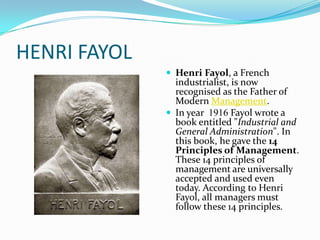
Henri Fayol's 14 Principles of Management
- 1. HENRI FAYOL Henri Fayol, a French industrialist, is now recognised as the Father of Modern Management. In year 1916 Fayol wrote a book entitled "Industrial and General Administration". In this book, he gave the 14 Principles of Management. These 14 principles of management are universally accepted and used even today. According to Henri Fayol, all managers must follow these 14 principles.
- 2. 14 Principles of Management. 1. Division of Work The full work of the organisation should be divided among individuals and departments. This is because a division of work leads to specialisation, and specialisation increases efficiency, and efficiency improves the productivity and profitability of the organisation. 2. Discipline Discipline means a respect for the rules and regulation of the organisation. Discipline may be Self-discipline, or it may be Enforced discipline. Self-discipline is the best discipline. However, if there is no self-discipline, then discipline should be enforced through penalties, fines, etc. No organisation can survive without discipline.
- 3. 3. Authority and responsibility According to Henri Fayol, there should be a balance between Authority (Power) and Responsibility (Duties). Authority must be equal to Responsibility. If the authority is more than responsibility then chances are that a manager may misuse it. If responsibility is more than authority then he may feel frustrated. 4. Subordination of Individual Interest to General Interest In an organisation, there are two types of interest, viz., the individual interest of the employees, and the general interest of the organisation. The individual interest should be given less importance, while the general interest should be given most importance. If not, the organisation will collapse.
- 4. 5. Remuneration Remuneration is the price for services received. If an organisation wants efficient employees and best performance, then it should have a good remuneration policy. This policy should give maximum satisfaction to both employer and employees. It should include both financial and non-financial incentives. 6. Centralization In centralisation, the authority is concentrated only in few hands. However, in decentralisation, the authority is distributed to all the levels of management. No organisation can be completely centralised or decentralised. If there is complete centralisation, then the subordinates will have no authority (power) to carry out their responsibility (duties). Similarly, if there is complete decentralisation, then the superior will have no authority to control the organisation. Therefore, there should be a balance between centralisation and decentralisation.
- 5. 7. Order There should be an Order for Things and People in the organisation. Order for things is called Material Order. Order for people is called Social Order. Material Order refers to "a place for everything and everything in its place." Social Order refers to the selection of the "right man in the right place". There must be orderly placement of the resources such as Men and Women, Money, Materials, etc. Misplacement will lead to misuse and disorder. 8. Equity The managers should use the equity while dealing with the employees. Equity is a combination of kindness and justice. Equity creates loyalty and devotion in the employees.
- 6. 9. Initiative Management should encourage initiative. That is, they should encourage the employees to make their own plans and to execute these plans. This is because an initiative gives satisfaction to the employees and brings success to the organisation. 10. Esprit De Corps Esprit de Corps means "Team Spirit". Therefore, the management should create unity, co-operation and team- spirit among the employees. They should avoid the divide and rule policy.
- 7. 11. Stability of Tenure An employee needs time to learn his job and to become efficient. Therefore, he should be given time to become efficient. When he becomes efficient, he should be made permanent. In other words, the employees should have job security. 12. Unity of Direction All activities which have the same objective must be directed by one manager, and he must use one plan. This is called Unity of Direction. For example, all marketing activities such as advertising, sales promotion, pricing policy, etc., must be directed by only one manager. He must use only one plan for all the marketing activities.
- 8. 13. Scalar Chain Scalar Chain is a line of authority. This line joins all the members (managers and employees) from top to bottom. Every member must know who is his superior. He must also know who is his subordinate. Scalar Chain is necessary for good communication. Scalar Chain must not be broken in norm circumstances. However, if quick action is necessary, then this chain can be broken. This is done using "Gang Plank" / "Bridge" / "Direct Contact". Scalar Chain is shown in diagram below with Gang plank as dotted line FP. The Scalar Chain is shown by a double ladder A to G and A to Q. A is the head of the organisation. B and L are the next level, and so on. If quick action is necessary, then a "Gang Plank" "FP" is made. Now F and P can contact each other directly but they should inform E and O about their decisions.
- 9. 14. Unity of Command According to this principle, a subordinate (employee) must have only one superior (boss or manager). A subordinate must receive orders from only one superior. In other words, a subordinate must report to only one superior. According to Fayol, if one subordinate receives orders from more than one superior then there will be disorder. This will affect the discipline, efficiency, productivity and profitability of the organisation. Unity of Command is a very important principle of management. This principle is based on the rule "Too many cooks spoil the soup."
